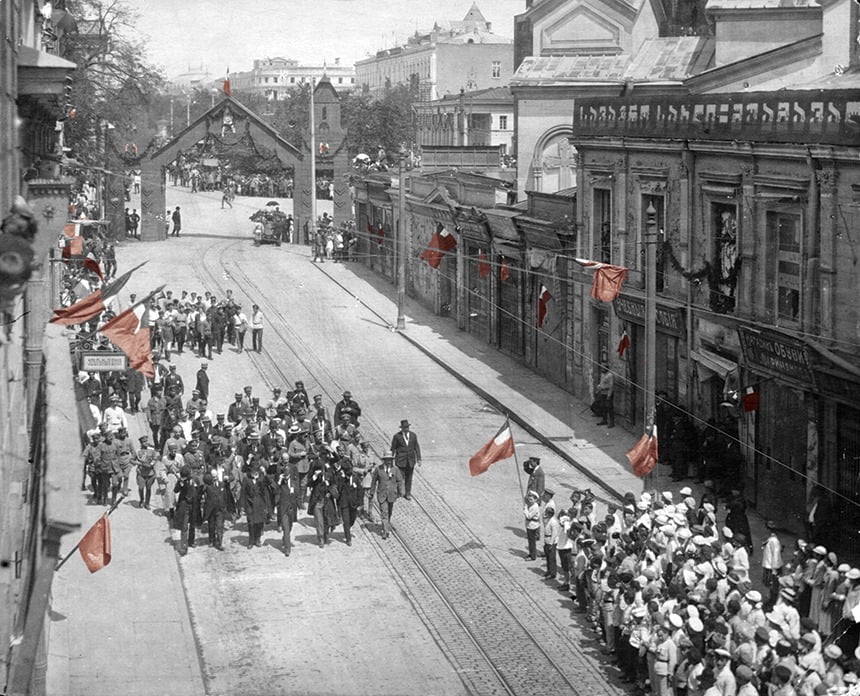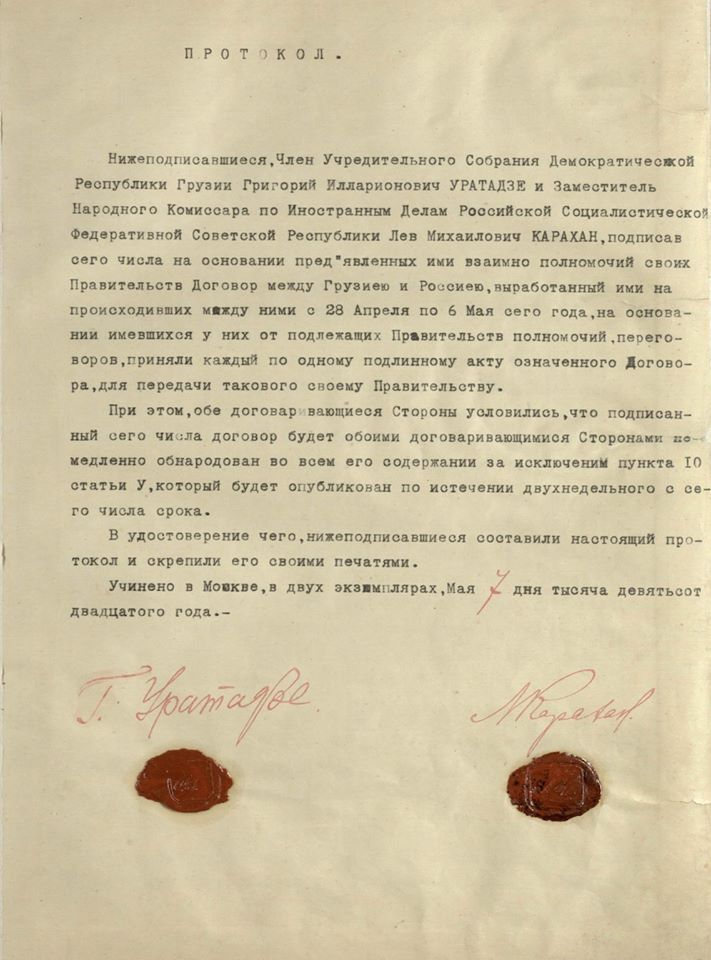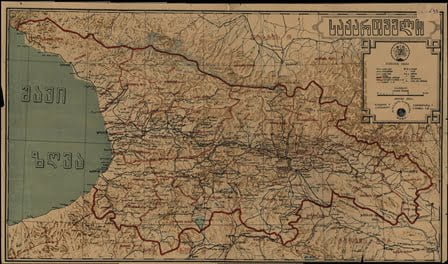Georgia’s Phantom Treaty
Treaty of Moscow 7 May 1920
“From now on, the Georgian Nation is accepted by the great nations, as equal – among equals”.
Those were the spirited words of Noe Zhordania, President of the Government of Democratic Republic of Georgia, upon the de facto recognition of Georgia by the Allied Powers at the Paris Peace Conference in January 1920.
Even though the new democratic state was still threatened by its northern neighbor, the future started to look brighter for the struggling Republic. But the Allied Powers lacked a common vision and agreement on the future of the Transcaucasian republics against the Bolshevik threat, detrimentally refusing to send Allied troops.
This emboldened the Soviets to further stoke revolt and unrest through their local proxies. Determined to regain lost Russian imperial territories, Lenin ordered the Red Army to launch a military assault on Azerbaijan in April 1920, establishing the Azerbaijan Soviet Socialist Republic in a matter of days.
A week later local Bolsheviks executed a failed coup in Georgia’s capital Tbilisi, wrongfully anticipating the arrival of the Red Army. The pressure on the Georgian leadership increased to secure Soviet recognition on paper. On 7 May 1920 Soviet Russia and the Democratic Republic of Georgia concluded the Treaty of Moscow in which the Soviets renounced any sovereignty over Georgian territory demarcated in the treaty.
“Russia recognizes unconditionally the existence and independence of the Georgian state, and voluntarily renounces all sovereign rights which belonged to Russia with respect to the Georgian people and territory.”
However, despite the much wanted recognition, the Georgians were on the short end of the stick. Article X and the secret annexe to the treaty arranged the legalization of communist parties and activities including their propaganda and agitation, exempting such activities from prosecution. Anyone detained for such activities was to be released.
Obviously, this was aimed at enabling a Soviet fifth column for subversive activities of Bolsheviks which the Georgian government had tried and continued to quell. The Georgian authorities were quite successful in neutralizing their activities. It helped that the communists were also not very popular among the population, which rendered the Soviet efforts to establish a fifth column to overthrow the state relatively ineffective. The Russian embassy in Tbilisi had hundreds of employees at its disposal, deploying subversive activities throughout the country, while being protected by diplomatic immunity.
Despite its concessions vis-à-vis the communists, the Treaty of Moscow was a welcome recognition in lack of international momentum, buying Georgia some time establish its state institutions and attempting to gain more international de jure recognition.
The treaty however rendered the latter rather pointless through article V. Specifically paragraphs five to eight which disallowed foreign troop presence on Georgian territory or foreign troops and volunteers within the Georgian military. In other words, the treaty ruled out any foreign military assistance in support of Georgian territorial integrity and sovereignty if that were to be threatened. Which was not an unlikely scenario at all given the Soviet eagerness to regain lost Russian Empire territories. British troops stationed in Batumi withdrew within months.
Fortunately for Georgia the Polish-Soviet war consumed Soviet military attention. Disruptive Soviet soft power influence however immediately resumed in May 1920 with various Bolshevik activities in Georgia. Despite treaty regulations to refrain from domestic interference, the Soviets inflamed discontent among the Ossetian agrarian based community with the Georgian economic policies in order to destabilize the Georgian republic. The ideological class struggle over topics such as landownership had been ongoing since the beginnings of the Republic, but was further exploited by the Soviets.
This also laid the ground for the conflict Georgia is still facing today. In contravention to the treaty Russian supported military forces entered Georgia in May 1920 after local Ossetians declared a Soviet Republic on Georgian territory. The Georgian military quickly crushed the rebellion and foreign invasion, with reportedly thousands of victims. This is currently referred to as the “South Ossetian genocide” by the de facto separatist authorities in Tskhinvali.
Meanwhile, after an armistice concluded the Polish-Soviet war in Autumn 1920 the Soviets annexed Armenia in a matter of days. Clearly, Georgia would be next. In yet another blow to Georgia’s quest for international recognition and sovereignty the country was denied membership to the League of Nations at the end of 1920. Only 10 out of 42 members supported Georgia’s application.

Despite the Soviet recognition of Georgia’s independence, the international community was still divided over the fate of former Russian territories. The de jure recognition of Georgia’s independence by the Allied powers in January 1921 was too little, too late. Georgia had already run out of time.
Decisive Soviet action was inevitable. Stalin, who did not support the 7 May treaty, schemed peasant revolts in Armenian and Azerbaijan borderlands of Georgia, while coercing Lenin into agreeing to come to the defence of their “comrades” in Georgia in mid-February 1921, when the Georgian army attempted to crush the Bolshevik rebellion.
Recognition of Georgian territorial integrity and sovereignty just nine months prior was all forgotten about, when the Red Army overran the country from all sides. The Georgian Bolsheviks proclaimed the Georgian Soviet Socialist Republic few weeks later.

Many factors contributed to the fall of the Democratic Republic of Georgia and the failure of the Treaty of Moscow, but certainly the lack of international embrace of the independence and territorial integrity of Georgia against a neighboring hostile imperial regime didn’t help.
The often troubled history of Georgia on the crossroads of cultures and regional powers can teach us one thing. Without a security umbrella provided by a major ally, the nation is vulnerable to hostile invasions. Apart from its powerful Golden Age in the 11th and 12th century when it was capable to fend off foreign invaders, Georgia was either involuntarily controlled and occupied or voluntarily protected by a regional power. The Mongols, Persians, Turks, and later, the Russians had their share.
It was also betrayed, more than once. In 1783 Eastern Georgia voluntarily entered a security alliance with the Russian Empire. When the Persians ransacked the country a decade later not much was left of the protection assurances. Instead, Russian military annexation followed in 1801 in order to subjugate the entire Transcaucasian region.
In 1918 the Georgians turned to the West. In his address in January 1920 Noe Zhordania unambiguously declared Georgia to be a European and Western nation:
“The West, or the East – this is the question that is posed to us and on this question, we cannot hesitate. We have always chosen and will continue to choose the West, and if the Bolsheviks cling to the East, this is only because the West refused them alliance, refused to recognize them.
You can see now, that the paths of Georgia and of Russia have diverged in this as well. Our path leads us to Europe, while Russia moves towards Asia. I know, the enemies will say – you are siding with the imperialists! But I say without hesitation: I’d rather stand with western imperialists than with eastern fanatics!”
This applied to Georgia then as much as now. The West however was not willing in 1920 to answer this call for embrace. It allowed Georgia to be involuntarily absorbed into “the [Bolshevik] East” for 70 years. Fridtjof Nansen, the League of Nations High Commissioner for Refugees, described the real politik rationale behind it:
“This outcome of so many untoward events was doubtless inevitable, and necessary for the sake of stability. Standing alone these [South Caucasian] republics could not have held their own against their more powerful neighbors”.
The Soviet breach of the Moscow Treaty was reflected in the Act of Restoration of State Independence of Georgia of 9 April 1991. In the 21st century former Russian colonies are still struggling with Kremlin policies designed to threaten their sovereignty. In 2013 President Putin was quoted saying “As far as South Caucasus is concerned, Russia never ever planned to quit it”.
Things have doubtlessly improved for Georgia’s international acceptance compared with a century ago. But the last decade has also proven Western partners, of which Zhordania spoke so highly, are not willing to provide the security umbrella exposed countries like Georgia need.
It is not too late to change all that. Let 1920 be the lesson learned.
